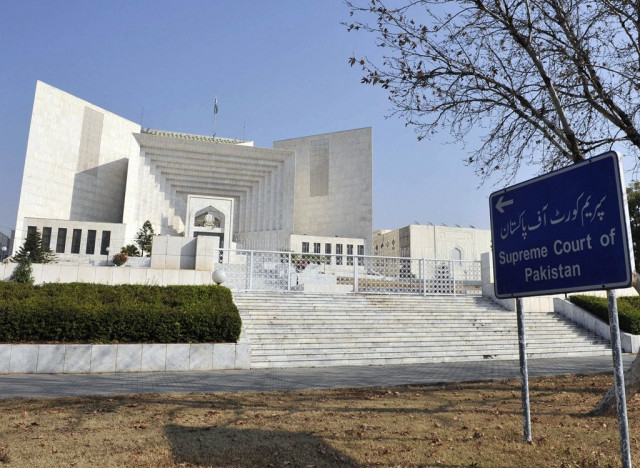Pre-arrest bail is extraordinary intervention: SC
SC judge issues order on petition of UC Jamshed Town Karachi Secretary Ghulam Farooq Channa

The Supreme Court of Pakistan. PHOTO: AFP/File
"Grant of bail to an accused required in a cognizable and non-bail offence prior to his arrest is an extraordinary judicial intervention in an ongoing or imminent investigative process" read a two-page order authored by Justice Qazi Muhammad Amin Ahmed.
The SC judge issued the order on a petition of Secretary Union Council Jamshed Town Karachi Ghulam Farooq Channa who had been avoiding arrest since August 28, 2019 and sought bail in anticipation.
Channa was accused of having fabricated a death certificate of one Naseem Begum Chotani, on the basis which his co-accused attempted to grab valuable properties held in the name of the woman.
Upon disclosure, the alleged scam was reported to the anti-corruption authorities and the petitioner and his accomplices were nominated as accused.
The counsel for the petitioner contended that the alleged fabrication was reported after five years and was carried out by some other people. He argued that his client was being made a scapegoat to save the real culprits, while the co-accused was still on post-arrest bail.
The court, while rejecting the bail request, noted that the petitioner was at the helm of affairs when the bogus certificate was issued.
It said cognizance on delayed disclosure does not mitigate the culpability nor can be equated with mala fide. The order further said the release of co-accused on post arrest bails was entirely beside the mark for the reasons stated above.
It noted that the pre-arrest bail clogged the very mechanics of the state authority to investigate and prosecute violations of law designated as crimes.
"To prevent arrest of an accused where it is so required by law is a measure with far-reaching consequences that may include loss or disappearance of evidence."
It noted that the remedy cannot be invoked in every run-of-the-mill criminal case prima facie supported by material and evidence, constituting a non-bailable/cognizable offence, warranting arrest, an inherent attribute of the dynamics of Criminal Justice System with a deterrent impact.
The order said it was certainly not a substitute for post-arrest bail.
After the issuance of order, a debate has started over its implications in criminal cases.
A senior law officer believes that the order referred to run-of-the-mill situation and the result arrived at was fully warranted by facts of the case.
He said the order still left doors open for pre-arrest bail especially where mala fide was involved and it was noted in this order.
He noted it was not a case under the National Accountability Ordinance where constitutional jurisdiction was opened by a larger bench.
The officer stated that the order was fully consistent with existing jurisprudence on pre-arrest bail and by no means shut the doors for such relief by high courts.
He said it was only a leave refusal order and does not amount to a binding judgment/decision under Article 189 of the Constitution and cannot be cited as a binding precedent.
“It is only a two-member bench order,” he added.
Another lawyer was of the opinion that Justice Qazi Amin Ahmed held consistent views on pre-arrest bail matters. Advocate Salman Safdar declared that pre-arrest bail was a matter of extraordinary relief and could be given in extraordinary circumstances.
However, lawyer Azam Nazeer Tarar, who has 25 years of experience to plead criminal cases, differed with the court's views.
He said it was an old view which restricted an individual’s rights and liberty and added that there were judgments wherein the court's view was more liberal in granting pre-arrest bail.
He said the view was acceptable only in cases where no one was falsely implicated by a complainant.
"In my experience, 50% people are falsely implicated in Pakistan. Same facts are also being narrated by the Human Rights Commission and other departments in their reports. In the prevailing situation, the court should not be harsh in granting bail,” Tarar said.
The lawyer said if the court is strict in granting bail then the investigators would become more powerful which would open doors of corruption. Another lawyer said if the court does not grant pre-arrest bail to the accused the jails will become overcrowded.



1724319076-0/Untitled-design-(5)1724319076-0-208x130.webp)















COMMENTS
Comments are moderated and generally will be posted if they are on-topic and not abusive.
For more information, please see our Comments FAQ